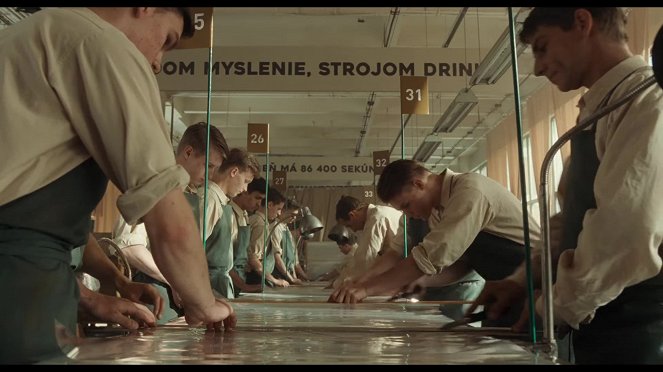Regie:
Matěj ChlupáčekDrehbuch:
Miro ŠifraKamera:
Martin DoubaMusik:
Simon GoffBesetzung:
Eliška Křenková, Miloslav König, Milan Ondrík, Marián Mitaš, Luboš Veselý, Martha Issová, Ladislav Hampl, Ján Jackuliak, Anton Šulík ml. (mehr)Inhalte(1)
In the 1930s, a pregnant doctor must navigate a web of superstition and prejudice while seeking the truth about a shocking find at her husband's factory. (Netflix)
Kritiken (8)
Für einen 29-jährigen Regisseur ist es ein unglaublich ehrgeiziges Filmprojekt mit starken intimen Momenten eines originellen und gesellschaftlich sensiblen Themas. Dieser Film funktioniert fantastisch als eine zeitlose Botschaft, in der über Vorurteile, Intoleranz und über die Beschränktheit der Gesellschaft gesprochen wird. Nicht jeder wird aber das Zusammenspiel der Nebenthemen (die problematische Beziehung zwischen der Hauptheldin und dem karrieristischen Ehemann, die beunruhigende Figur des Mitarbeiters der Spionageabwehr) oder die industrielle Baťa-Mikrowelt als gelungen betrachten. Dabei verleiht gerade diese Welt dem Film eine Zuschauer-Attraktivität und eine historische Verankerung der Geschichte für eine bessere Betonung des Gedankens. Die schön stilisierten Studiokulissen im Vordergrund der Hohen Tatra bilden eine Patina des künstlerischen Gleichnisses. Manche Details sind unreif. Die meisten tschechischen Filmemacher würden sich aber nicht trauen, so ein Gleichnis zu drehen. Matěj Chlupáček ist woanders. Wenn er in den nächsten zehn Jahren den gleichen Weg wie zwischen Touchless und We Have Never Been Modern geht, wird es nach seinem dritten Spielfilm auch in Cannes und in Venedig Standing Ovations geben. [Karlovy Vary IFF]
()
I would very roughly describe We Have Never Been Modern as a period detective melodrama, but it cannot fulfil any of the characteristics of that genre, because it is a film with a fluid genre identity. This corresponds to one of the film’s central themes, which is the inconstancy of gender identities and social roles, as well as the impossibility of incorporating certain facts into familiar frameworks and categories. Though the story takes place in the 1930s, its strength lies in something that isn’t often seen in Czech period dramas – it clearly relates to problems that are relevant to the present. The essence of the film is not the black-and-white struggle against Nazism or Communism, but rather the current feeling of anxiety caused by a society that is only outwardly modern while it allows the restriction of human rights and individuality under the pretext of rationalisation, automation, security, economic growth and building a better tomorrow. If we wanted to identify a villain in the narrative, it’s not the state or the group representing a particular ideology, but the company and its capitalist logic based on thoughtless expansion and exploitation. This is connected with the key theme of the clash between tradition and modernity, where it is again shown that even though we have state-of-the-art production processes, that doesn’t help us much if there isn’t any progress in the thinking of people who cling to certain prejudices and stereotypes and who have the need to determine for others what is normal and to tell people how they are supposed to live. The consequence of that is that this emerging better world is accessible only to those who submit to the given norms and fall in line. The intersex character is a threat to the given order and rationality. In how the others treat her, we see an example of the reactions that we can still encounter today. Ridicule, denial and elimination, as well as the effort to ascertain the necessary facts and to understand exactly what it means not to unambiguously be either a man or a woman from the biological perspective. Together with how the reaction of the female protagonist played by Eliška Křenková evolves, the genre of the film also evolves. Mysterious crime thriller, science film, melodrama, social drama… Though I understand that the changes in genre and making the otherwise imperceptible style visible (the animated interlude, Helena’s glances into the camera, the pointing out of how every retelling of events is also an interpretation over which the participants in those events have no control) may be unsettling for some, they are based on what the film thematises, i.e. rebelling against norms, being uncategorisable, deviating from convention. This brings both anxiety and an awakening (or a new perspective on the matter), which is true both for both Saša and Helena, who realises who or what is important to her in life. Just as the film is ambiguous in terms of genre, the characters are not black-and-white. The complex female protagonist, again something quite rare in Czech cinema, is portrayed superbly by Eliška Křenková. Her Helena convincingly transitions between bitterly commenting on the events happening around her and displays of sensitivity, while also imposing on others her idea of what she thinks is right. The clash of different worlds and attitudes is not conveyed only in the scenography or the work with colours, but also in the contrasting acting performance (the informal Křenková vs. the deliberately affected König), as well as in the use of anachronisms (for example, the fact that the characters use modern language), which highlights the parallels with today. Whereas, in the end, Helena looks to the future with legitimate concerns (as we should too), the future of Czech audio-visual art appears to be somewhat more promising with creators such as Šifra, Douba and Chlupáček. Their We Have Never Been Modern is in fact a modern, refreshing film with a well-developed concept that I believe can spur a discussion of issues that should be addressed today.
()
(weniger)
(mehr)
Someone filmed a series that was decided to be only a film in post-production. Actually, I'm a bit disappointed not to rate it higher because its crafty creative ambitions are easily justifiable on a European scale, but the development of the plot on multiple fronts only leads to a satisfying conclusion in one case (the marital dispute on the staircase, where the perception of the characters is completely turned around, is a screenplay gem, no debate about it), while each of the fronts deserved to be explored much more. Thus, it remains a cheap crime story from a dime-store detective novel, the building of capitalism on the scale of a newspaper article, and a counter-diversion action from a wet dream of a novice spy. However, the "modern" theme of the film holds up, a bit clumsily but effectively and sensitively, in retro attire. 3 and ½.
()
Schade, dass sich der Film mit keinem der Themen, die in ihm angesprochen werden (die Baťa-Utopie/-Dystopie, die Toleranz, die politische Feindseligkeit der Ersten Tschechoslowakischen Republik, die Position der Frauen in der Gesellschaft), mehr beschäftigt. Er präsentiert eigentlich nur Feststellungen. Eine ähnliche Verlegenheit ist bei der Arbeit mit den Genre-Schichten der ansonsten fesselnd aufgebauten Geschichte bemerkbar. Der Film wirkt so einsam wie die Hauptheldin, deren verdächtige „Korrektheit“ erst am Ende hinterfragt wird. Das starke Dilemma wird in der Komfortzone des Baťa-Modernismus sehr vorsichtig gelöst. Die Schritte des Films sind bedächtig, seine Erklärungen ein wenig unbeholfen (der animierte Vortrag des Arztes über den Hermaphroditismus war der einzige WTF-Moment). Trotzdem gehört er zu den interessanteren Werken, welche die tschechische Kinematografie in den letzten Jahren produziert hat. Man spürt, dass der Film anders sein möchte, dass er ein souverän gelöster Film aus der Vergangenheit sein will. Ich hatte aber trotzdem das Gefühl, dass er manchmal über seine eigenen Beine stolpert, weil er versucht, neue Wege zu gehen.
()
Zu ehrgeizig und gleichzeitig zu schwach. Genremäßig nicht verankert, insgesamt unsicher. Ist es ein Thriller? Ist es ein Krimi? Ein Drama? Ein historischer Film? Ein psychologischer Film? Ein modernes Melodrama? Niemand weiß es, aber viele Zuschauer*innen applaudieren, weil es einfach anders ist. Manche werden von der malerischen Tatra und der Umgebung von Baťas Svit abgelenkt. Ein anderer Zuschauer wird den Hermaphroditismus interessant finden (obwohl dieses Thema von einem anderen historischen Film, Berlin '36, besser behandelt wurde) und nur wenige erkennen, wie schwach die psychologische Linie zwischen den Hauptfiguren ist. Die Interaktionen zwischen den Nebenfiguren sind verkürzt und obwohl der Film eine gelungene Kamera hat, bleiben die Ausstattung, die Kostüme und die Masken des Jahres 1937 wirklich nur vage realistisch. Das sind die Schauspieler, die nach den letzten Trends der Barbershops gestylt sind, Jersey-Jacken und Kapuzenpullover tragen… Heutzutage ist das verständlich, in diesem historischen Film aber sinnlos. Einige Details sind zwar gelungen, wie zum Beispiel die Verwendung des Liedes von František Krištof Veselý, aber das Gesamtbild versagt. Egal, ob es sich um einen Krimi, ein Drama oder eine Aufklärung handelt.
()
Ein überdurchschnittlich gedrehtes durchschnittliches Gleichnis, dessen Handlung nicht besonders überraschend ist. Die Figuren (bis auf eine) bleiben in den engen Schubladen, die ihnen das Drehbuch zugewiesen hat. Und obwohl die Botschaft lobenswert ist, wirkt dieser Film eher krampfhaft. Schade, dass die Autoren nicht beispielsweise auf die Geschichte von Zdeňka Koubková / Zdeněk Koubek aus derselben Zeit zurückgegriffen haben, die interessanter ist und vor allem tatsächlich passiert ist.
()
Great technical level. The choice of time and setting and the associated production design, the use of miniature buildings and the effects that embed live characters in them is great. Even the prosthetic make-up on Ladislav Hampl's face looks pretty solid. But the story, its associated themes and characters work less well and at times seem as heavy-handed as the dumb English title We Have Never Been Modern. I have a problem with several of the moral aspects of the film, which are either presented as entirely unproblematic or, for good measure, not mentioned at all. Overall, however, this is still one of the more thematically interesting works of Czech cinema this year, though in my opinion somewhat along the lines of the saying “in the land of the the blind, the one-eyed is king”. [KVIFF 2022]
()
We Have Never Been Modern profitiert von einem ungewöhnlichen Thema - für tschechische, aber ich denke auch für internationale Verhältnisse - und verbindet mehrere thematische oder Genre-Ebenen recht geschickt: von einem Beziehungsdrama über eine (Pseudo)-Krimigeschichte bis hin zu einer gewissen sozialen Sonde in die 1930er Jahre, aber mit einer zeitlosen Überschneidung. Man könnte an Chlupáčeks Film sicherlich einiges bemängeln - siehe die wenig authentische Sprache von Helena (vor allem bei Sarkasmus) oder die hagere Erscheinung von Ladislav Hampl (man hätte sicherlich hierzulande einen "molligeren" Kollegen finden können) - aber bei mir überwiegen eher die positiven Eindrücke. Hermaphroditismus (wie Aphasie in den diesjährigen Silent Secrets) ist kein ganz alltägliches Thema, und es birgt sicherlich noch andere Möglichkeiten. In We Have Never Been Modern wird dieses Thema durch ein ansprechendes Zeitkolorit - hier möchte ich vor allem das Bühnenbild, aber auch die Kostüme loben - und mehrere führende Dichotomien (Mann x Frau, Fabrikarbeiter x Arbeiter, "Gottes Geschöpf" x "gottloses Monster") verstärkt. Von den Darstellern würde ich vor allem Eliska Křenková, aber auch Richard Langdon hervorheben; beeindruckt war ich auch von der kleineren Rolle des Ján Jackuliak, der für einen der stärksten Momente des Films sorgte. Ich bin gespannt, welches Projekt sich Chlupáček als nächstes ausdenken wird.
()

